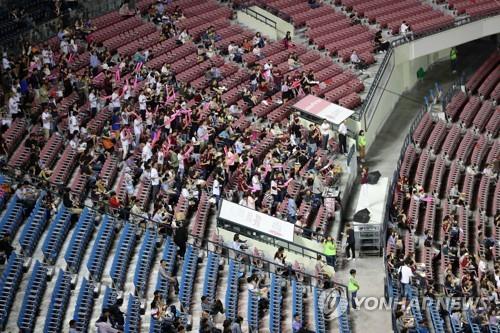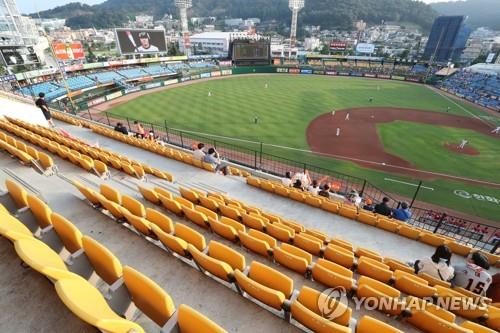- California Assembly OKs highest minimum wage in nation
- S. Korea unveils first graphic cigarette warnings
- US joins with South Korea, Japan in bid to deter North Korea
- LPGA golfer Chun In-gee finally back in action
- S. Korea won’t be top seed in final World Cup qualification round
- US men’s soccer misses 2nd straight Olympics
- US back on track in qualifying with 4-0 win over Guatemala
- High-intensity workout injuries spawn cottage industry
- CDC expands range of Zika mosquitoes into parts of Northeast
- Who knew? ‘The Walking Dead’ is helping families connect
Top baseball league on pace to suffer 1st decrease in attendance in 5 years
SEOUL, Sept. 27 (Yonhap) –– South Korea’s top baseball league could post its first drop in total annual attendance in five years in 2018, figures showed on Thursday, with factors ranging from poor air quality to the lopsided pennant race sending fans elsewhere.
Through Wednesday’s games, the Korea Baseball Organization (KBO) has drawn a little over 7.37 million fans, or a daily average of 11,073.
At the same point a year ago, the KBO clubs were attracting 11,447 fans per game.
If the pace doesn’t pick up, the league will end up with about 7.99 million fans, down from an all-time record of just over 8.4 million fans in 2017.

This file photo from Sept. 12, 2018, shows swathes of empty seats during a Korea Baseball Organization (KBO) regular season game between the LG Twins and the Nexen Heroes at Jamsil Stadium in Seoul. Data showed on Sept. 27, 2018, that KBO’s attendance in September nosedived 20.9 percent from a year ago. (Yonhap)
The KBO surpassed the 7 million mark for the first time in 2012 with 7.16 million fans, but the figure fell to 6.44 million in 2013.
Attendance bounced back to 6.51 million in 2014, and has been on the rise in each ensuing season through last year. The NC Dinos joined the KBO in 2013, followed by the KT Wiz in 2015 for the current, 10-club structure.
Prior to this season, the KBO set out to bring 8.79 million fans to the stadiums. But only three clubs — Hanwha Eagles, SK Wyverns and Samsung Lions — have met their preseason target.
The Nexen Heroes, which have been in the bottom half of the league in attendance in every season since their inception in 2008, have suffered a 34 percent drop in attendance this year — from 666,510 to 439,387 over 68 home games. Though the Heroes are in position to return to the postseason after missing out last year, they’ve also dealt with a series of off-field issues. Their former CEO, Lee Chang-suk, has been sentenced to three and a half years in prison on embezzlement charges, and their closer and catcher, Cho Sang-woo and Park Dong-won, were charged with sexual assault in May.
The Kia Tigers, the 2017 Korean Series champions, have fallen in both the standings and attendance rankings. After posting the league’s best regular season record last year, they’re in fifth place this year at 63-66, and their home attendance has dropped by 18 percent.
In April, the first full month of the season, attendance fell by 2.6 percent from a year ago, with fine dust discouraging fans from flocking to ballparks and forcing cancellation of games for the first time in league history.
As a record-breaking heat wave engulfed the nation, the KBO attendance fell by 12 percent in July and 7.2 percent in August, compared to 2017.

This file photo from July 25, 2018, shows empty sections at Hanwha Life Eagles Park in Daejeon, 160 kilometers south of Seoul, during a Korea Baseball Organization (KBO) regular season game between the Hanwha Eagles and the Kia Tigers. The KBO said attendance in July fell 12 percent compared with a year ago amid a record-breaking heat wave. (Yonhap)
September has seen the most precipitous on-year drop, with a 20.9 percent decrease.
The KBO mandated a three-week break from mid-August to early-September while the league’s star players competed for the national team at the Asian Games in Jakarta. Despite capturing its third straight gold medal, South Korea was mostly an unpopular champion because of public anger surrounding the selection of some players: critics argued that coaches chose those players only to help them earn exemption from mandatory military service, granted to male gold medalists at Asian Games.
Once the league resumed play in the first week of September, casual fans who lost interest in baseball during the break likely didn’t return, while more dedicated ones became too disenchanted with the league to keep filling the seats at the same rate as before.
In the eyes of one KBO official, another factor may be that the pennant race isn’t nearly as compelling as last year. In 2017, three of the five postseason berths, including first place, were determined on the final day of the regular season in what was the tightest pennant race in league history.
This year, the Doosan Bears clinched the best regular season record on Tuesday, with a dozen games to spare. The only race — and an underwhelming one at that — is for the fifth and wild card spot among three clubs currently under .500 in winning percentage.
The official still chose to look on the brighter side.
“Over the past two days during Chuseok holiday, we drew more than 170,000 leaguewide,” the official said. “We’re counting on some big numbers this weekend as well. If the wild card race goes down the wire, we could see an uptick in attendance.”











